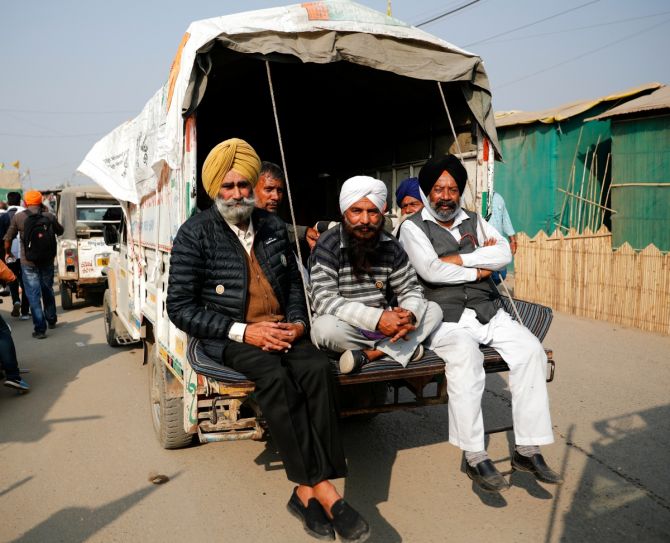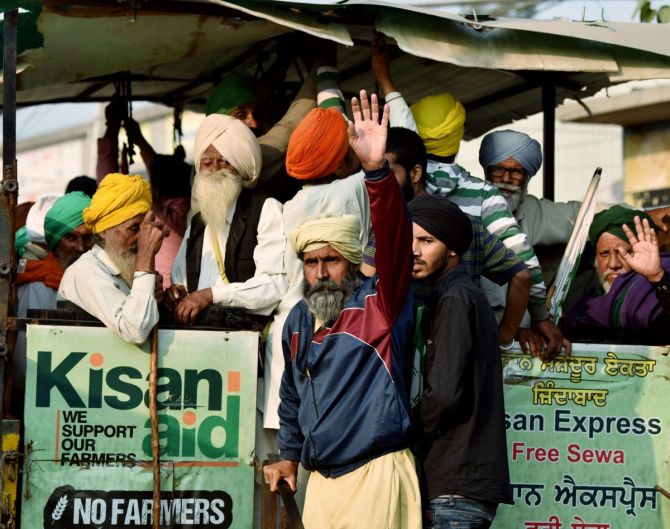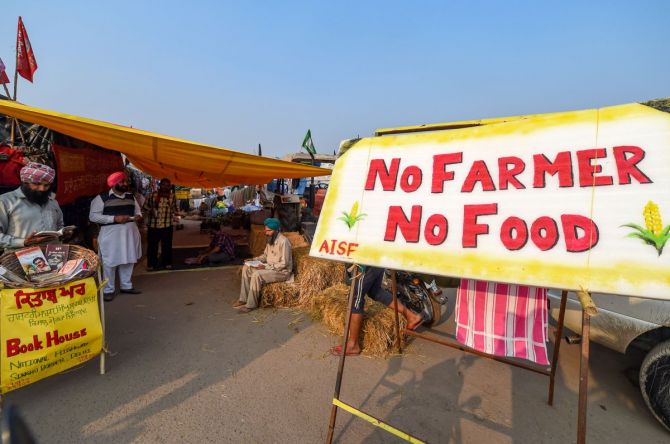The Centre's retreat from the farm laws is likely to have a significant bearing on the fate of laws that the Centre has made, for instance, in labour and electricity, predicts A K Bhattacharya.

Prime Minister Narendra Modi's decision to secure the repeal of the three contentious farm laws that his government had got Parliament to approve by September 2020 has triggered a plethora of comments, interpreting what the rollback decision means for Indian agriculture.
In general, the commentary has been that the repeal of the new laws would be a setback for agricultural reforms and the government should rethink the way such important decisions can be implemented without inviting political opposition to them.
Such an interpretation can hardly be faulted, although it has its own limitations, failing as it does to notice how certain changes in the Indian polity and its political economy could have led to the Modi government's decision on the repeal of the farm laws.
In the last few years, the political and economic backdrop in India has created new forces that should not be ignored while assessing how and why Modi decided on the rollback.
Equally important, the new reality of India under the Modi regime has ensured that economic policy-making in the months to come would not be what it was in the past few years.
What are the key attributes of the new reality that has grown roots in India in the last couple of years? Several features of that reality are worth recounting.
Evaluating them would also help in a more rounded appreciation of how and why the rollback on farm laws took place.

The emergence of the Modi government after the 2019 general elections with a clear majority had led to the exercise of its political capital for fulfilling the ruling party's ambitious political agenda.
These included the decisions to render Article 370 of the Constitution inoperative and introduce amendments to the citizenship law that effectively discriminated against one of the minority communities.
It was clear that the government's political majority was enough for achieving its political agenda.
That success perhaps gave the Modi government the confidence to use the same political majority to achieve its economic agenda as well.
In retrospect, this attempt was a miscalculation.
What clicked in the political space, aimed at specific segments of the population, did not work in the economic space, where the stakeholders affected by the proposed policy change were diverse even as they enjoyed greater political empowerment.
Farmers in north India and a few state governments were not going to be easy pushovers.
The agitation by farmers heralded yet another change.
Running as it did for about a year, the agitation established for the first time in recent years that the politics of movement had become a potent instrument to make the government more accountable to people.
That this was largely on display in northern India's political heartland of western Uttar Pradesh, Haryana and Punjab was as significant as the absence of any such stir in large parts of southern or western India.
This too is likely to shape the nature of politics and economic policy making in the country in the coming years.
The changed equation between economic policy and politics also meant that the year-long farmers' agitation against the farm laws got its fuel not so much from the strength of its opposition to the proposed policy framework for farmers as from the political idea of mounting an opposition to the ruling party at the Centre.
Indeed, a defining nature of the farmers' agitation was its ability to have brought together many disparate elements on a common platform that was united in its opposition to Modi and his brand of politics and policies.
What mattered more was the opposition to the Modi regime and far less to the specific offending provisions of the three farm laws.

The irony was that an experts committee, set up by the Supreme Court, had submitted its report on the merit and substance of the farmers' agitation against the farm laws.
The content of the report was not made public by the apex court.
Consequently, there was no debate over what the experts had opined on the farm laws or how they wanted the stalemate to be resolved.
Issues pertaining to the farm laws became less important than the overall need for their repeal by a government that was seen to have been indifferent to the need to ensure consultation and consensus on a new framework for India's farmers.
A related issue, completely ignored so far, arose from the specific nature of the economic policy changes that the new farm laws aimed to bring about.
It is not often recognised that changing fiscal policy or trade policy is not the same as relaxing or tightening policies on land, labour or farming.
Early in his first tenure as prime minister, Modi realised how difficult it was to introduce land reforms.
The ordinances on land reforms were allowed to lapse in the face of a major campaign launched by the Congress and many other states, where the Modi government was accused of being a government of the rich.
It was then argued that the Modi government did not enjoy a clear majority in Parliament and hence was more circumspect about the move.
But after 2019 all such inhibitions were cast aside.
The moves on citizenship law amendment and Article 370 showed that the political mandate indeed was a password for fulfilling the political agenda.
Even taxation initiatives, tariff changes and privatisation plans faced no hurdles.
However, notifying the labour law reforms continues to be plagued with delays, even though the laws were passed several months ago.
The farm laws have now faced a big setback with the farmers' agitation forcing the government to withdraw them.
The realisation that laws on land, labour and farm are far more difficult has now dawned on the Modi government and is reflective of the new reality of India.
The farmers' agitation brought into sharp focus another significant change in India.
Over the last few years, the states have become increasingly uncomfortable with the way their policy space has been encroached upon by the Centre.
Agriculture, like labour, land and electricity, is an area that comes under the policy domain of the states as well.
Many states do not look kindly at the Centre's attempt to make laws in these areas.
The Centre's retreat from the farm laws is likely to have a significant bearing on the fate of laws that the Centre has made, for instance, in labour and electricity.
The big question is whether the farmers' agitation and the government response are an inflexion point in India's politics.
Which direction politics takes now and whether the Centre can enter into a cooperative arrangement with the states will have a bearing on the kind of economic policy regime that India could expect in the near future.
Feature Presentation: Rajesh Alva/Rediff.com












 © 2025
© 2025